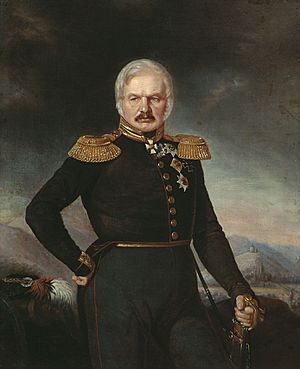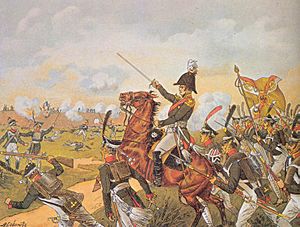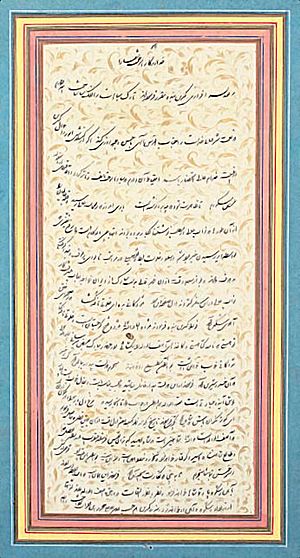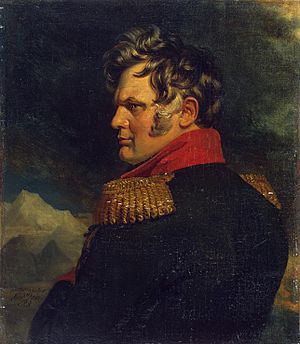Aleksey Petrovich Yermolov facts for kids
Quick facts for kids
Aleksey Petrovich Yermolov
|
|
|---|---|

Portrait by Pyotr Zakharov-Chechenets (c.1843)
|
|
| Born | 4 June 1777 Moscow, Russian Empire |
| Died | 23 April 1861 (aged 83) Moscow, Russian Empire |
| Allegiance | |
| Service/ |
Imperial Russian Army |
| Years of service | 1787–1827 |
| Rank | General of the Infantry |
| Battles/wars | Kościuszko Uprising Persian Expedition of 1796 Napoleonic Wars
Russo-Persian War (1826–28) |
| Awards | Order of St. Andrew Order of St. George Order of St. Vladimir Order of Saint Anna Order of St. Alexander Nevsky Order of the White Eagle |
Aleksey Petrovich Yermolov (Russian: Алексе́й Петро́вич Ермо́лов; June 4, 1777 – April 23, 1861) was an important Russian general in the 19th century. He led Russian troops in the Caucasian War. He fought in almost all the Russian battles against the French army during the Napoleonic Wars.
At one point, he was accused of plotting against Tsar Paul I and was sent away from the capital. But two years later, Alexander I pardoned him and brought him back into the army. Yermolov showed great skill during the Napoleonic Wars. He was especially noted in battles like Austerlitz, Borodino, and Kulm. After these wars, he led the Russian efforts to take control of the Caucasus region.
| Top - 0-9 A B C D E F G H I J K L M N O P Q R S T U V W X Y Z |
Early Life and First Steps in the Army
Aleksey Yermolov was born in Moscow on June 4, 1777. His family was a noble family from the Oryol Governorate. He went to a special school at Moscow University.
In 1787, when he was just 10 years old, he joined the Preobrazhensky Regiment, a special guard unit. Four years later, he became a lieutenant. He then moved to the Nizhegorod Dragoon Regiment as a captain.
In 1793, he briefly taught at a military school. Then, in 1794, he was sent to fight in the Polish campaign. He took part in a big attack on Praga and received an award, the Order of St. George. The next year, Yermolov joined the Persian campaign near the Caspian Sea.
However, in 1799, he was arrested. People thought he was involved in a plot against Tsar Paul I. He was sent away to Kostroma for two years. While there, he taught himself Latin.
After Tsar Paul I was killed in 1801, the new emperor, Alexander I, forgave Yermolov. He returned to the military and began to study the ideas of the famous general Alexander Suvorov. Yermolov felt he was now a student of Suvorov.
Fighting in the Napoleonic Wars

Yermolov's military skills really shone during the Napoleonic Wars. In the War of the Third Coalition, he fought bravely in the front and back lines. He was recognized for his actions at Amstetten and Austerlitz. Because of this, he was promoted to colonel in 1806.
The next year, he fought in Poland. He commanded an artillery group and showed great courage during battles like Battle of Eylau. In June 1807, Yermolov led a horse artillery company in several battles, including Friedland. He received another award, the Order of St. George.
In 1808, he became a major general. He was put in charge of inspecting horse artillery units. In 1811, he took command of a guard artillery company. In 1812, he became the Chief of Staff for the First Western Army.
During the 1812 Campaign, Yermolov helped with the retreat to Smolensk. He also played a role in disagreements between two other generals, Barclay de Tolly and Bagration. Yermolov did not agree with Barclay's plans. He asked Emperor Alexander I to replace Barclay with Bagration.
After the Russian armies joined together in August, Yermolov fought at Smolensk. He was promoted to lieutenant general in November 1812. He was also very brave at the Battle of Borodino. There, he was slightly hurt while leading a counterattack that took back an important fort called the Great Redoubt. For his bravery, Yermolov received the Order of St. Anna.
Later in the campaign, he served at the main Russian army headquarters. He fought in battles like Maloyaroslavets and Vyazma. In late November, he commanded a group in the advance guard during the fighting at the Berezina River. In December 1812, he became the Chief of Staff of the Russian army. Three weeks later, he was put in charge of all the Russian armies' artillery.
In 1813 and 1814, Yermolov was in charge of the artillery for the allied armies in Europe. His strong leadership was very important for their success in the Battle of Kulm. In 1813, he fought at Lützen and Bautzen. At Kulm, he received the Prussian Iron Cross award. In 1814, he showed great skill in the battle around Paris and received the Order of St. George.
Leading in the Caucasus

After the Napoleonic Wars, Yermolov's main job was to make sure Russia controlled Georgia and other areas it had recently taken from Persia. He also needed to control the Caucasus mountains, which separated these new lands from the rest of the Russian Empire. This meant dealing with the local tribes living there.
Yermolov also had an important diplomatic mission. He had to go to Tehran to avoid giving back some land to Fat′h-Ali Shah Qajar that Russia had promised after a treaty in 1813.
As the commander-in-chief in the Caucasus, Yermolov was known for his very strict military approach. He once wrote to Emperor Alexander I, "I want the fear of my name to protect our borders more strongly than chains or forts." He became commander-in-chief of Russian forces in Georgia in 1816. His promotion upset some people in Russia, and he made many enemies. However, he was a good leader and successfully negotiated with Persia in 1818. He was then promoted to general of infantry.
In 1817, he built a fort on the Sunzha river. The next year, he founded the fortress of Grozny. After the local highlanders attacked, he led a strong response against them. His firm actions helped keep many allied tribes loyal to Russia.
For ten years, he was both the military commander in Georgia and the imperial ambassador to Persia. His independent nature often caused problems with the Ministry of War. Despite this, his soldiers liked him. He was generally successful in fighting the highlanders of Dagestan, but he could not stop all uprisings.
In 1825, Yermolov found out that Alexander Griboyedov was about to be arrested for being involved in the Decembrist revolt. Yermolov warned him, which allowed Griboyedov to destroy some important papers and avoid arrest.
Yermolov's career ended suddenly in 1827. He was replaced by Nicholas I's favorite general, Ivan Paskevich. The exact reasons are not fully clear, but Nicholas did not like him. Yermolov was blamed for not keeping the tribes under control. He was discharged from the army in December 1827 with a full pension. However, four years later, Nicholas gave him back his rank and appointed him to the State Council.
Later Life and Retirement
For the last 30 years of his life, Yermolov lived quietly at his home near Oryol. During the Crimean War, he was asked to lead a peasant army, but he refused because of his poor health. He died on April 23, 1861, in Moscow. He was buried at the Trinity Church in Oryol.
Yermolov wrote interesting and valuable memoirs about his time in service from 1796 to 1816. His Zapiski (Memoirs) are divided into three parts. They cover his early career, his time in the Napoleonic Wars, and his service in the Caucasus. These memoirs were published after his death.
Awards and Recognition
Yermolov received many important awards. These included the Russian Orders of:
- St. Andrew the First Called
- St. Vladimir (1st class)
- St. Alexander Nevsky
- the White Eagle
- St. Anna (1st class)
He also received foreign awards, such as:
- The Prussian Orders of the Red Eagle (1st class) and the Pour le Mérite
- The Military Order of Maria Theresa (3rd class)
- The Baden Order of Karl Friedrich
- The Persian Order of the Lion and the Sun
- Two golden swords for courage, one of which had diamonds.
Impact and Legacy
Yermolov was one of the best artillery officers in the Russian army. He showed his skills throughout the Napoleonic Wars and later in the Caucasus. However, he was also a clever and sometimes tricky person. Because of his complex personality, he was often called the "Modern Sphinx." He was a very firm and effective ruler in the Caucasus.
He appears as a character in Leo Tolstoy's famous 1869 novel War and Peace. He is also in Prokofiev's opera based on the novel.
Yermolov is a historical figure who is still debated today. Many Russian people respect him for his military skills, bravery, and strategies. Poets like Alexander Pushkin and Vasily Zhukovsky wrote poems that made his leadership seem very heroic.
However, in the Caucasus region (except for Ossetia), many people remember Yermolov for his harsh actions.
Since 2000, a multi-purpose ship in Russia has been named "General Yermolov" to honor him.
See also
 In Spanish: Alekséi Yermólov para niños
In Spanish: Alekséi Yermólov para niños
 | Aurelia Browder |
 | Nannie Helen Burroughs |
 | Michelle Alexander |


